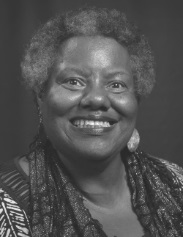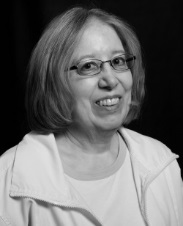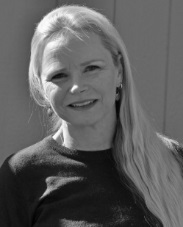Twisting Topeka (24 page)
Authors: Lissa Staley
Tags: #what if, #alternate history, #community, #kansas, #speculative, #library, #twist, #collaborative, #topeka

Eighteen writers crafted wonderfully
diverse stories, and then revised their work based on feedback from
their peers. By engaging a community of writers in content
creation, publishing, and marketing through a hands-on
collaborative project, we model techniques that each writer can use
in their own personal writing career.
Join us to read, write and publish at
tscpl.org/novel.
Lissa Staley and Miranda
Ericsson
August 2016
Project Organizers
Topeka and Shawnee County Public
Library
Author Biographies and
Interviews
Annette Hope
Billings
As Mercy Would Have
It

The story of the 1964
murder of Topekan Gladys Johnson, which sparked
Annette Hope Billings’
As Mercy
Would Have It,
has held a place in her
memory since she was seven years old. Though most known for her
poetry, the author also enjoys the challenges of story development
in short stories, novels and plays. A nurse for four decades, she
retired early to pursue writing on a full-time basis.
Her award-winning
collection of poetry,
A Net Full of
Hope,
was published in 2015 and
is available in e-book and paperback on Amazon
at: tinyurl.com/anfohbook
.
She is due to release a chapbook of
affirmations,
Descants for a
Daughter,
this summer.
What was the inspiration
for writing your story?
A murder of a child is not
something I’d usually consider writing about, but I’ve always had a
clear memory of the distress in my home and community when a young
African-American girl was murdered in 1964. I was only seven at the
time, but my memory of it is that of a much older child. I am a
grandmother and the idea of incorporating a loving grandmother in a
story based on that event felt good. I was also inspired to not let
the murder of the child be the end of her in my story.
What’s the most important
writing advice you’ve received? What writing advice would you share
with other writers?
The best advice I’ve
received is often given to writers, but I certainly rings true for
me. It is “write what you know.” I think we often underestimate the
value and power of our lived experiences. The best writing comes
when a writer realizes they harbor a gold mine unlike anyone else’s
gold mine.
How do you make time for
writing? Do you write on a schedule, or write for a certain amount
of time each day, or do you only write when you feel
inspired?
I am immensely blessed to
not have an 8 to 5 job syphoning off time and energy from my
writing. I try to write every day, but there are many
marketing/scheduling items that I have to devote time to also. Even
as a full-time writer, I still feel I have more ideas than I have
time to write about. I consider this a blessing as writer’s block
is a foreign term to me (knock on wood!). I believe I have
particularly faithful muses who have waited patiently for
me.
What is your most memorable
moment from this year’s Community Novel Project?
I think it was the moment
I realized I was actually making my story better the more
I edited it! It made what remained a much better
read. I liked being able to “let go” of words-- even those I had
labored hardest to write. In that moment I realized what it means
to honor the story more than any particular word, sentence, or even
paragraph.
Anna
belle Corrick
Psychic Shift

Annabelle Corrick
usually writes contemporary fiction, with
occasional lapses into light verse. Her stories often involve a
“what-if” element. In “Psychic Shift,” the inciting incident
actually occurred, the take-off point being the identity of and the
effect of the encounter on the young man in the meditation garden.
Recent publications include stories and poems in
Well Versed
,
The Poet’s Art
,
and
Kansas Voices.
Why did you want to
participate in the Community Novel Project?
My participation in the
Community Novel Project evolved from attending the Fiction Writing
Basics Workshop on February 23. Its focus was on short story
writing, my primary mode of late.
What was your inspiration
for your story
?
One of the workshop
exercises used the Menninger Foundation as a famous Topeka/NE
Kansas name to spur ideas for a “what if”/ speculative story. I
recalled a childhood experience hiking onto the Menninger grounds
with a friend and surprising a lone patient in a meditation garden.
What he looked like and his amazed expression has stayed with me. I
wondered about the extent of the impact on him and what it might
have been if he were suicidal. I knew three persons associated with
the Clinic who had been. I recalled my realization that
psychotherapeutic treatments didn’t work for everyone because those
three didn’t survive it. What if the intersection of one troubled
patient with two happily carefree, errant children caused the most
positive outcome and a new direction for psychiatric care?
Recalling the expression on the patient’s face led me to pursue
that twist of fate. He was handsome in a very refined and perfect
way, hence the speculation that he might have been an actor trying
to succeed at a time when more rugged types were in
vogue.
What’s the most important
writing advice you’ve received? What writing advice would you share
with other writers?
My writing (playwriting)
teachers at K-State said, “If you want to be a writer, write.” So
did Epictetus back in the first century, but they never cited him.
The Fiction Writing Basics Workshop focusing on short story writing
also included this advice. If you’re already following it
naturally, then you’re on the right track. It’s probably no
coincidence, though, that Epictetus had to be a Stoic philosopher.
Would he be surprised that he’s not in spellchecker?
How do you make time for
writing?
Work schedules for creative
writing are a lot like outlines and synopses—highly recommended
necessary tools that cannot always be easily followed due to pesky
variables.
Jamie Crispin
Test Year

Jamie Crispin
certainly has a way of viewing society. A
self-proclaimed feminist with a master’s in sociology, her writings
tend to point out society’s quirks with a dystopian twist. Her
interests include traveling between parallel worlds, running after
her toddler son and listening to podcasts. On most days, you can
find her patiently awaiting the second season of
FireFly
.
Test Year
is her first
short story.
Why did you want to
participate in the Community Novel Project?
I decided to participate in
the Community Novel Project so I could start “walking the talk”. It
has been a dream of mine for years to write a book. But there was
one issue. I didn’t know where to start. I feel there is no better
way to add life into an intention then to take action. So, I told
my novice self I had to start somewhere and that somewhere was the
Community Novel Project (CNP). The CNP created a safe, nurturing
and explorative environment for my writing experience. The
workshops provided me with information I could apply immediately.
The deadlines helped me stay on track. And the support of the CNP
staff was truly inspiring. Now, I feel I can officially call myself
an author – even if I just wrote one short story!
What was the inspiration
for writing your story?
I live on the same block as
Randolph School. I have seen it in every season, in all weather and
throughout many events. The building is an inspiring backdrop and I
have many storylines about Randolph School. I paired that location
with my love of dystopic fiction and found that the story found me,
in the end.
What have you learned about
writing fiction from participating in this project?
Easy – I learned that short
stories may not be my genre. But for me, it was all about finding
success through the completion of this process. The Community Novel
Project pushed me outside of my comfort zone, which I realized had
to happen so I could grow. In the end, I am so proud of my final
product even if it is not perfect. I would not have been able to
achieve these results without the peer editing, deadlines and
informative workshops. Now, I feel I can apply this knowledge and
confidence on a larger scale. So, if you are reading this and
considering participating next year then DO IT! Every minute, every
edit and each draft was completely worth the effort. Without a
doubt, I am a better writer from this experience.
What’s the most important
writing advice you’ve received? What writing advice would you share
with other writers?
I attended the workshop on
editing with Morgan Chilson and found it not only enlightening, but
extremely useful. The speaker said, “Sometimes, you have to kill
your babies!” Of course, in this context, “babies” are parts of the
story we hold especially dear to our hearts. I found when I was
struggling with editing that it was due to a personal connection to
a specific line, character or concept. If I stepped away from my
work and saw it through the reader’s eyes instead, then I was able
to make better judgment calls during the revisions. In the end,
many of my “babies” were cut during the editing process. It was a
difficult lesson, but I did manage to produce a stronger and more
cohesive story. It is the best advice I can give to others. Don’t
let your brilliance blind you.
Aimee L. Gross
Dance with the
Devil

